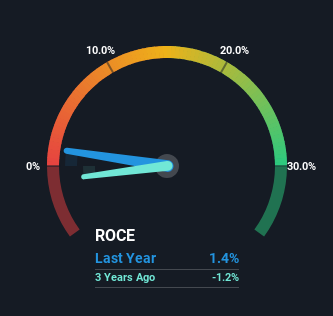There Are Reasons To Feel Uneasy About GVP Infotech's (NSE:GVPTECH) Returns On Capital
Finding a business that has the potential to grow substantially is not easy, but it is possible if we look at a few key financial metrics. Typically, we'll want to notice a trend of growing return on capital employed (ROCE) and alongside that, an expanding base of capital employed. Basically this means that a company has profitable initiatives that it can continue to reinvest in, which is a trait of a compounding machine. However, after investigating GVP Infotech (NSE:GVPTECH), we don't think it's current trends fit the mold of a multi-bagger.
Understanding Return On Capital Employed (ROCE)
For those that aren't sure what ROCE is, it measures the amount of pre-tax profits a company can generate from the capital employed in its business. The formula for this calculation on GVP Infotech is:
Return on Capital Employed = Earnings Before Interest and Tax (EBIT) ÷ (Total Assets - Current Liabilities)
0.014 = ₹24m ÷ (₹1.8b - ₹67m) (Based on the trailing twelve months to June 2024).
Therefore, GVP Infotech has an ROCE of 1.4%. In absolute terms, that's a low return and it also under-performs the IT industry average of 16%.
See our latest analysis for GVP Infotech

While the past is not representative of the future, it can be helpful to know how a company has performed historically, which is why we have this chart above. If you're interested in investigating GVP Infotech's past further, check out this free graph covering GVP Infotech's past earnings, revenue and cash flow.
The Trend Of ROCE
On the surface, the trend of ROCE at GVP Infotech doesn't inspire confidence. To be more specific, ROCE has fallen from 8.9% over the last five years. Given the business is employing more capital while revenue has slipped, this is a bit concerning. This could mean that the business is losing its competitive advantage or market share, because while more money is being put into ventures, it's actually producing a lower return - "less bang for their buck" per se.
On a related note, GVP Infotech has decreased its current liabilities to 3.8% of total assets. Considering it used to be 68%, that's a huge drop in that ratio and it would explain the decline in ROCE. Effectively this means their suppliers or short-term creditors are funding less of the business, which reduces some elements of risk. Some would claim this reduces the business' efficiency at generating ROCE since it is now funding more of the operations with its own money.
The Key Takeaway
From the above analysis, we find it rather worrisome that returns on capital and sales for GVP Infotech have fallen, meanwhile the business is employing more capital than it was five years ago. And, the stock has remained flat over the last year, so investors don't seem too impressed either. Unless there is a shift to a more positive trajectory in these metrics, we would look elsewhere.
GVP Infotech does have some risks, we noticed 4 warning signs (and 1 which is significant) we think you should know about.
If you want to search for solid companies with great earnings, check out this free list of companies with good balance sheets and impressive returns on equity.
New: Manage All Your Stock Portfolios in One Place
We've created the ultimate portfolio companion for stock investors, and it's free.
• Connect an unlimited number of Portfolios and see your total in one currency
• Be alerted to new Warning Signs or Risks via email or mobile
• Track the Fair Value of your stocks
Have feedback on this article? Concerned about the content? Get in touch with us directly. Alternatively, email editorial-team (at) simplywallst.com.
This article by Simply Wall St is general in nature. We provide commentary based on historical data and analyst forecasts only using an unbiased methodology and our articles are not intended to be financial advice. It does not constitute a recommendation to buy or sell any stock, and does not take account of your objectives, or your financial situation. We aim to bring you long-term focused analysis driven by fundamental data. Note that our analysis may not factor in the latest price-sensitive company announcements or qualitative material. Simply Wall St has no position in any stocks mentioned.
About NSEI:GVPTECH
GVP Infotech
Engages in information technology (IT) and cable infrastructure business in India.
Flawless balance sheet with slight risk.
Market Insights
Community Narratives




